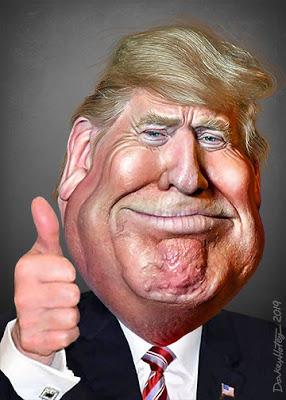 (This caricature of Donald Trump is by the inimitable DonkeyHotey.)
(This caricature of Donald Trump is by the inimitable DonkeyHotey.)Donald Trump has always claimed to be a great and very successful businessman -- even though many of his ventures have failed, and he couldn't even make a success of a casino. And he claimed that his success in business would translate into success as a president.
His presidency has been an utter failure -- a disaster that has put the nation in danger. Now we know that his business acumen was also just a myth (LIE).
The New York Times got hold of his tax figures for a 10 year period (1985 to 1994). It turns out that Trump lost $1.17 billion in those 10 years, and in eight of the 10 years he paid no taxes at all.
Trump is either the worst businessman of all time, or he is guilty of massive tax fraud -- maybe both.
This also gives us a clue as to why Trump is so adamant about not releasing his more recent tax returns. The House has asked for the last six years of Trump's tax returns, but he has ordered his Treasury Secretary and IRS Director to refuse to release those returns -- and they are complying with his order.
What is he trying to hide? Is it that he continues to be the worst businessman in this country, and he's living on borrowed money (most of it coming from Russia)?
Here is some of what Chris Cillizza at CNN has to say about this:
More than $1 billion in losses in a single decade! More than double the losses of the nearest other taxpayer in 1990 and 1991! The single biggest loser (of money) of all American taxpayers in the period 1985-1994! What the Times story does is something simple but profound: It punctures the balloon -- puffed up by years of Trumpian marketing and salesmanship -- that the President of the United States was some sort of business genius. In fact, Trump was one of -- if not the -- biggest failures (in terms of money making and losing) in the country during a decade-long stretch. His ability to maintain his wealth and, eventually, to grow it was born of taking advantage of a system of tax laws and loopholes friendly to big business. . . . Here's why this Times story matters so, so much: Trump explicitly ran for president on the idea that his business acumen gave him a unique -- and more valuable -- perspective on how to run the country than anyone else who had ever held the office (and certainly the other Republicans and Democrats running for the White House in 2016.) . . . A huge part of Trump's appeal was encased in the idea that he was the American dream: A super-wealthy guy with a beautiful wife, lots of homes and his own plane with his name on the side. His years as a reality TV star served to codify that idea in peoples' minds; Trump was always getting off a helicopter or riding in a limousine -- in the middle of some major deal that would make him millions. Thanks to The New York Times, we know now all of that was pure American myth-making. Trump wasn't -- as he tried to portray himself -- a self-made man at all. As the Times reported in October 2018: "Mr. Trump received the equivalent today of at least $413 million from his father's real estate empire, starting when he was a toddler and continuing to this day." His wealth was hugely derived from his father. (Trump famously/infamously said his father, Fred, gave him only a "small" $1 million loan as he began his career as a real estate developer.) And now we know that during a critical period of his business life, Trump was losing more than $1 billion in a 10-year span -- a total that made him one of the single largest losers of money in America at the time. Put plainly: The story that Donald Trump has been telling himself and the American public for much of his life -- and especially since becoming a presidential candidate in 2015 -- isn't true. And it's more than an exaggeration. It's the opposite of what happened. Trump was gifted huge amounts of money by his father. He lost it at eye-popping rates. Will any of this matter to Trump's supporters or, more broadly, to the 2020 electorate? Probably not. Minds have been made up -- on both sides -- about Trump for a very long time. Facts and reality don't seem to puncture those opinions about the President. But whether voters vote on this issue next November is, really, beside the point. And the point is this: Donald Trump is not the person he sold himself to be to the American public in 2016. Period.

